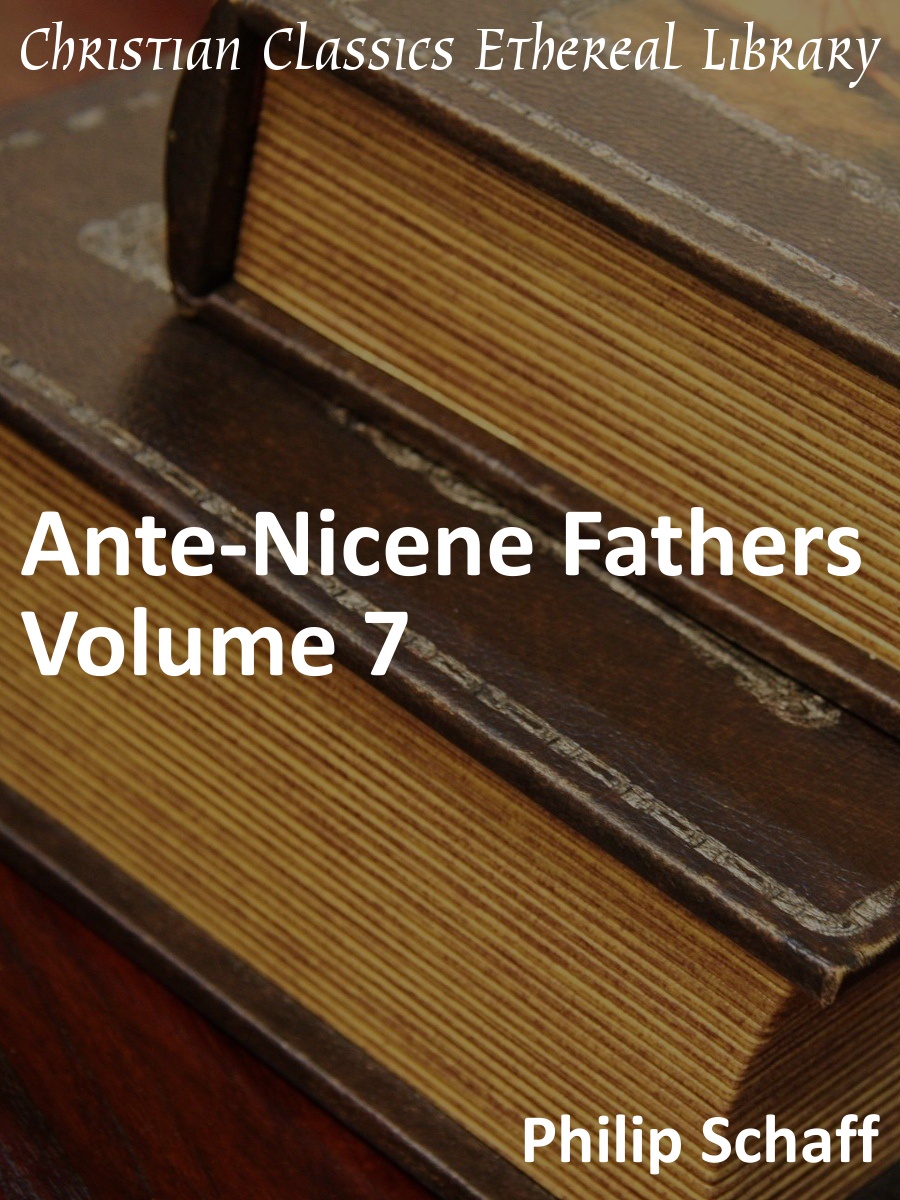Show only:
Classics only
Sort by:
CCEL Search results
NPNF1-02. St. Augustine's City of God and Christian Doctrine by Schaff, Philip (1819-1893)
Not So Censurable as that of the Manichæans, But that Even It is Objectionable, Because It Ascribes the Origin of Vices to the Nature of The Flesh. There is no need, therefore, that in our sins and vices we accuse the nature of the flesh to the injury of the Creator, for in its own kind and degree the flesh is good; but to desert the Creator good, and live according to the created good,…
ANF05. Fathers of the Third Century: Hippolytus, Cyprian, Caius, Novatian, Appendix by Schaff, Philip (1819-1893)
Treatise of Novation Concerning the Trinity by Novatian (c.200-258)
. According to Pamelius, ch. xxvi. Argument.—Moreover Also, from the Fact that He Who Was Seen of Abraham is Called God;…
Elect Lady by MacDonald, George (1824-1905)
THE WOOER. Alexa kept hoping that George would be satisfied she was not inclined toward him as she had been; and that, instead of bringing the matter to open issue, he would continue to come and go as the friend of her father.
Catholic Encyclopedia, Volume 7: Gregory XII-Infallability by Herbermann, Charles George (1840-1916)
French painter, b. at Tournus in Ardeche, 21 August, 1725; d. at Paris, 21 March, 1805. His father, a master-tiler, wished to make him an architect, but ended by leaving him free to follow his own vocation, and sent him to Lyons to study under Gromdon, father-in-law of the musician Grétry.
Practice of Piety: Directing a Christian How to Walk, that He May Please God by Bayly, Lewis (1565-1631)
O eternal God and heavenly Father, if I were not taught and assured by the promises of thy gospel, and the examples of Peter, Mary Magdalene, the publican, the prodigal child, and many other penitent sinners, that thou art so full of compassion, and so ready to forgive the greatest sinners, who are heaviest laden with sin, at what time soever they return unto thee with penitent hearts,…
ANF07. Fathers of the Third and Fourth Centuries: Lactantius, Venantius, Asterius, Victorinus, Dionysius, Apostolic Teaching and Constitutions, Homily, and Liturgies by Schaff, Philip (1819-1893)
Divine Institutes by Lucius Caecilius Firmianus Lactantius (c.240-c.320)
. At times, however, they perceive that they are wicked, and praise the condition of the former ages, and conjecture that justice is absent because of their characters and deserts; for,…
Catholic Encyclopedia, Volume 4: Clandestinity-Diocesan Chancery by Herbermann, Charles George (1840-1916)
Ecclesiastical Conferences are meetings of clerics for the purpose of discussing, in general, matters pertaining to their state of life, and, in particular, questions of moral theology and liturgy. HISTORICAL SKETCH The origin of ecclesiastical conferences has been sought in the assemblies of hermits of the Egyptian deserts.
Morning and Evening: Daily Readings by Spurgeon, Charles Haddon (1834-1892)
Go To Morning Reading “She called his name Ben-oni (son of sorrow), but his father called him Benjamin (son of my right hand).” Genesis 35:18 To every matter there is a bright as well as a dark side.
Catholic Encyclopedia, Volume 3: Brownson-Clairvaux by Herbermann, Charles George (1840-1916)
Dominican Tertiary, born at Siena, 25 March, 1347; died at Rome, 29 April, 1380. She was the youngest but one of a very large family. Her father, Giacomo di Benincasa, was a dyer; her mother, Lapa, the daughter of a local poet.
Bede's Ecclesiastical History of England by Bede, St. ("The Venerable," c. 673-735)
till the time of the Arian heresy. [325 AD] When the storm of persecution ceased, the faithful Christians, who, during the time of danger, had hidden themselves in woods and deserts and secret caves, came forth and rebuilt the churches which had been levelled to the ground; founded, erected, and finished the cathedrals raised in honour of the holy martyrs, and,…

